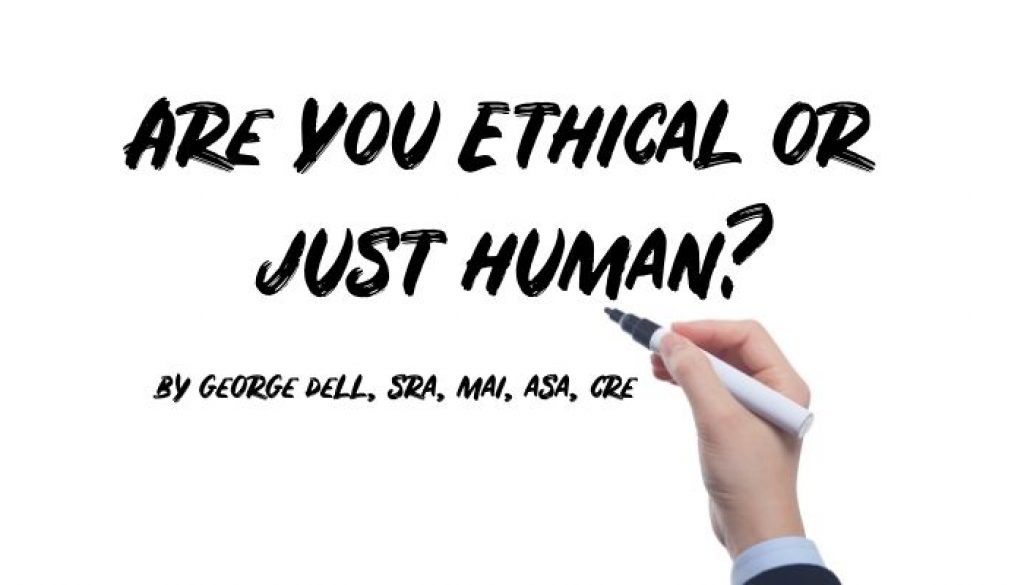Do you follow ethical rules, or moral principles? How does human psychology play in?
It is proven that appraisers’ opinions mostly match sale price (for loans). Justifications are:
- The price simply reflects an efficient market.
- The price lands inside Richard Ratcliffe’s “transaction zone”. (The principle here is that a real “most probable” value does not exist.)
- An “adequate Scope of Work” requires the appraiser to do what peers do.
- An “adequate Scope of Work” requires the appraiser to meet users’ expectations.
Is there a yet another, more dodgy reason? Is it some form of hidden bias? Can it just be humans being human?
There are many forms of human bias. All kinds: cognitive behavioral, social, and memory-error biases. Many. Dozens.
And there is one form of bias that stands out. It is called “anchoring.” Once we are given a number, there seems to be a tendency to psychologically anchor to that number.
Described by Tversky and Kahneman in 1974, the process happens without awareness. One experiment asked participants to write down the last three digits of their phone number. “Results showed that people’s subsequent estimate of house prices were significantly influenced by the arbitrary anchor.” (This in spite of market information given prior to the experiment.) [Source: behavioraleconomics.com]
This principle is known by most sales agents, where the first house shown helps influence perceptions of the houses shown afterwards.
Other basic normal human motives also play in – consciously or unconsciously. We desire to please our client, to be liked, even loved, for what we do for them. We want them to continue giving us business. To support our families. To enhance our prestige. Or even to “help someone get a home they deserve.”
How can we deal with this built-in human bias? There are two possible solutions.
One is to use a blind, or even ‘double-blind’ process. The appraiser (or AVM selector) is not given the sale price. Or better yet, the person/system ordering the appraisal does not know the sale price (to prevent subtle cues). This would be an excellent solution. It would reduce or eliminate the anchoring problem. The difficulty is in practice. (Because others already know the sale price.)
Another solution comes from the world of data science.
Data visualization and algorithmic modeling can dramatically sharpen judgment — while improving accuracy and precision. There is still judgment involved, it’s just different. Data science explicitly recognizes the need for subject-matter expertise. What happens in Evidence Based Appraisal© is that judgment calls are reduced to specific and clearly supported algorithmic decisions. These calls are easily corroborated by other humans.
These data science methods and related critical thinking require training. And appraisers are ideally situated to capitalize on prior knowledge of markets, methods and means. Judgment is necessary. It’s just gonna be different.
Valuemetrics.info education focuses on the data, the science, summary numbers, and visual means. These building blocks enforce an effective meld of algorithms and judgment.

March 18, 2020 @ 9:11 am
I specialize in private appraisals (trust, date of death) so I deal with various forms of anchoring all the time. Land values located in semi-rural desert areas that have not changed much, if at all, in 40 years come to mind. We paid xxx 40 years ago so it MUST be worth more today… It can be fun and interesting to watch eyes widen as I take someone through the process of un-anchoring.
Another popular anchor is Zillow. Oh, don’t even get me started…..
March 21, 2020 @ 2:43 pm
Tens of thousands of appraisers were taught from day one to Bracket the Sales Price, not knowing that was a bias. Anytime Price is a comparable search criteria, bias starts.
I too was taught this by the S&L I started with, though I questioned it, along with their List of Adjustments, which were applied to all size and quality homes, from every location be it the slums or the most expensive enclave.
It speeds up the process when the appraiser does not have to think about things, and can use Templates and Auto Adjust to get a report done fast. Imagine how it would slow things down if adjustments had to be tailored to the location, size and quality of the home?
What our Peers do is a fallacy in that one could never get a written statement from them on what they do. Conversely, appraisers are quick to judge the work of others, given the chance. The only way to prove what they do would be to have copies of their work with the same issue or issues one is dealing with.
What a production appraiser can get by with, may be a far cry from the use of the good appraisal processes and procedures that we all certify compliance with.
Creating reports that are auditable, that can be verified by others using a proper SOW criterion, is a good thing, a good goal in fact….